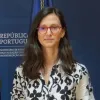Application process for the preparation of FFMS studies and policy papers
The application process for the preparation of studies and policy papers promoted by Fundação Francisco Manuel dos Santos (FFMS) will remain open for the duration of the current study programme (2024-2026). Applications, written in English, should be sent to the following email address: estudos@ffms.pt
FFMS studies should deal comprehensively with the reality in question and include proposals for national public policies. The estimated duration of this preparation is two years, which is followed by a public presentation.
FFMS policy papers are documents that are quick and easy to read, with recommendations and lines of action for decision-makers and those responsible for national public policies. The estimated duration of this preparation is six months, which is followed by a public presentation.
The application assessment process is made up of five stages, while the analysis and decision-making process can go on for a few months more.
Concept Note:
Applicants must complete a concept note in order to explain the objectives of the study or policy paper, its potential for innovation in scientific literature, its conformity with the thematic lines of research identified in the Research Programme (2024-2026) and the social impact expected if the project is approved. The submitted proposal will be analysed by the Fundação Francisco Manuel dos Santos studies team, which includes its scientific consultants, who will decide whether or not it should go forward to the second stage of the application process.
Project Proposal:
If the proposal goes through to the second stage, applicants will be asked to fill in a more detailed form (project proposal), which should include a literature review, the methodology to be applied and the project budget, among other information. This second form will then be analysed by the scientific advisor and two experts from outside the Foundation, specifically hired for this purpose, using the double blind method, which is similar to the model adopted by international academic journals.
Revaluation and resubmission:
After the consultant and external experts have analysed the applications, and according to their comments, the applicants have the opportunity to reformulate them. It is important to emphasise that this phase, as with the submission of scientific articles to academic journals, may involve more than one reformulation by the applicants, since the main purpose of this process is to refine the applications and consequently make them more solid.
Decision by the Foundation's Governing Bodies
The final proposal, together with the non-binding opinions of the consultant and external experts, will be analysed by the Governing Bodies of the Fundação Francisco Manuel dos Santos. Only those projects that are positively evaluated will be recommended for approval. The Governing Bodies of the Foundation reserve the right to reject projects that have received a favourable opinion from the Foundation's study team, if they consider that other applications present better conditions for fulfilling the statutory mission of the Fundação Francisco Manuel dos Santos.
Ethics Committee
In line with good international practice, approved projects will be assessed by the Foundation's Ethics Committee, which will issue guidelines on the conduct of the study/policy paper throughout all stages of its development. The Ethics Committee's opinions are intended to ensure compliance with the rules set out in the Foundation's Charter of Ethical Principles for the Research Area
The Ethics Committee is made up of three independent personalities of recognised merit, appointed by decision of the Foundation's Board of Directors

Fundação Francisco Manuel dos Santos was set up in 2009, with the statutory mission of promoting and learning more about the Portuguese reality.
With this in mind, an FFMS study area was set up and it has published more than 70 academic studies in a wide variety of areas of social science since 2012.
The research topics to be explored in the projects selected by FFMS are determined by its governing bodies beforehand and published in the three-year study programme. In the 2024-2026 three-year period, FFMS prioritises three main research topics: 1) Economic development; 2) Social policies for combatting poverty and inequality; 3) Quality of democracy. You can learn more about the study programme for this three-year period here.
The FFMS study authors, usually academics with ties to national and international universities and research centres, are selected through a transparent public application process in order to assure the integrity and independence of the research produced. This assessment process is always open and favours multidisciplinary international applications.
The FFMS scientific team monitors the development of the projects approved by the governing bodies and assists the contracted research teams with publications and other promotional materials, as well as in the production of events arising from the studies carried out in order to transmit the information collected to the general public, free of charge and easy to access.
Applications can be submitted throughout the duration of this study programme (2024-2026). In other words, from the announcement of the programme to the end of 2026. In the latter case, implementation of the projects approved will only begin in the subsequent three-year period.
Yes. Generally speaking, Fundação Francisco Manuel dos Santos promotes studies or policy papers that fall under the most varied of areas in social science, doing justice to its statutory mission of learning more about Portuguese society and publishing information on it.
The FFMS research topics to be focused on throughout the 2024-2026 three-year period are available on the FFMS website, in the section on its study programme.
No. FFMS has established no funding limit for its studies or policy papers. The FFMS governing bodies analyse all of the applications submitted and decide, on a case-by-case basis, if the budget requested is in line with the goals of the corresponding project.
Yes. If the contracted researchers have ties to universities or research centres, FFMS may pay up to 20% of all project overheads.
Yes. FFMS accepts applications from individual researchers. Even so, it is rare for projects to be assigned to individual researchers as the studies contracted by FFMS usually involve multidisciplinary teams, sometimes international ones, of a certain size.
On average, the studies promoted by FFMS take around two years to prepare. However, this average value is merely indicative and the preparation of a certain study could take a little more or less time, whenever this serves the purpose of the project.
Yes. Both the contracted researchers and the application reviewers are suitably rewarded for their work. FFMS has a fee table that is applied uniformly and the contracted authors are informed of this.
Normally, the researchers contracted by FFMS are academics with relevant publications in a certain scientific area, so it is unlikely that somebody who has not yet completed their PHD would be coordinating an FFMS study, although there is nothing to prevent this. However, FFMS study coordinators usually contract research fellows and other less experienced researchers to work on their projects.
FFMS studies do not have to be confined to one scientific area. In fact, FFMS favours studies that are transversal to several scientific areas, provided that this option adds to the project in question.
Fundação Francisco Manuel dos Santos was set up with the purpose of learning more about Portuguese society. Even so, FFMS promotes studies that make it possible to make comparisons with countries similar to Portugal, particularly European Union member states and OECD member states, as well as countries in Southern Europe, whenever this option contributes to understanding more about Portuguese society. You can learn more about the research topics for this three-year period (2024-2026) here.
Yes. FFMS also promotes projects that include international members (Portuguese living abroad or citizens of other countries). FFMS assures the publication of the project results in Portuguese, thus complying with its statutory mission, even if the authors do not speak Portuguese. Nevertheless, it is important to point out that all the studies should focus on the Portuguese reality even if they include data on other countries or communities.
No. FFMS is statutorily prevented from funding master's degree or PhD courses, fellowships or sabbaticals for the purpose of scientific research.
No. FFMS budgets for study publication costs only after these have been approved, in accordance with the communication strategy it has laid out.
Apart from assessing the applications, the FFMS scientific team is also in charge of monitoring the projects approved. To this end, a project manager and a scientific adviser with expertise in the area in question are assigned to each research team contracted. The scientific team also assists in event production and the publication of promotional materials for the studies (books, infographics, videos, etc.).
No. The scientific team only works on publications arising from the scientific studies promoted by FFMS. Any other proposals should be sent to the general email (ffms@ffms.pt).
To learn more about the Portuguese reality, FFMS brought together a team of specialists that promote and validate the preparation of studies and policy papers on three main research topics: 1) Economic development; 2) Social policies for combatting poverty and inequality; 3) Quality of democracy.
Economy
The impact of corporate income tax on the Portuguese economy
The housing crisis in big cities - an analysis
Crises in the Portuguese economy
Financiamento do empreendedorismo em Portugal
The Real Estate Market in Portugal: prices, rents, tourism and accessibility
From made in to created in: A new paradigm for the Portuguese economy
Crisis and Credit: Lessons from the 2008-2013 Recession
Portuguese companies in international trade
Debt indexed to GDP in the Portuguese economy
Private companies and municipalities: dynamics and performance
Business dynamics and inequality
Diversification and growth of the Portuguese economy
The economic impact of European funds
Infrastructure investment in Portugal
Three decades of European Portugal
The Cadastre and Rural Property in Portugal
Institutions
After all, how many people abstain from voting in Portugal?
The essentials of Portuguese politics
Ethics and integrity in politics: Perceptions, control and impact
Regulatory State in Portugal: Evolution and Performance
Interest groups in the Portuguese political system
A new normal? Impacts and lessons from two years of the pandemic in Portugal
The courts and the economic and financial crisis
Institutions and the quality of democracy: political culture in Southern Europe
Quality of local governance in Portugal
Intergenerational justice and sustainability
Values, Institutional Quality and Development
Making laws: Portugal and Europe
The Public Prosecutor's Office in Europe
Portugal and European decision-making
Society
How we eat what we eat: a portrait of meal consumption in Portugal
Portugal Unequal | A portrait of income inequality and poverty in the country
Places of well-being: asymmetries in Portuguese municipalities
Young People in Portugal Today
Poverty in Portugal: Trajectories and Daily Life
The developments in science in Portugal
Religious identities and social dynamics in the Lisbon Metropolitan Area
Sustainability of the Portuguese Pension System
Migration and demographic sustainability
Is repeating the year beneficial for students?
Income Inequality and Poverty in Portugal
Decisive factors in fertility in Portugal
Scientific Culture in Portugal
Multimedia in Science Teaching
Demographic dynamics and the ageing of the Portuguese population
Science and Technology in Portugal
Portuguese Literature and Teaching
Science in pre-school education
Teaching children how to read in the 1st Cycle of Basic Education
What science do we learn at school?
Drugs and Tuition Fees, Legislative Impact Assessments
Projections 2030 and the Future
Economic Inequality in Portugal








